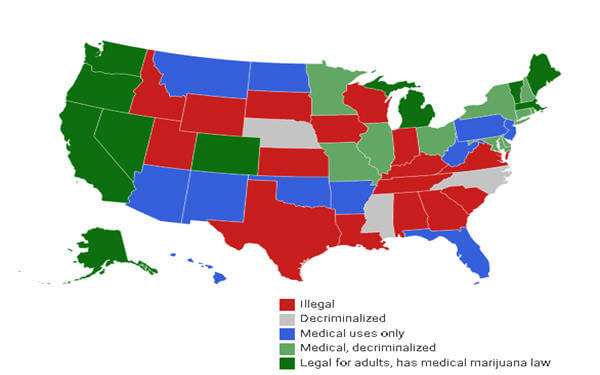
Michigan voted to legalize marijuana for recreational use, ending decades of prohibition and ushering in a new era of cannabis law and a burgeoning cannabis industry.
Cannabis stocks got an initial boost following Tuesday’s midterm election results that largely favored the marijuana industry. Shares of major cannabis companies rallied during Wednesday’s premarket. Tilray gained as much as 6.6 percent; Canopy Growth added 3 percent; Aurora Cannabis rose 3.6 percent; Cronos Group was 4.2 percent higher; and Aphria was up 2.4 percent. All retreated from most of the gains by midday.
“I think people are waiting for the Berlin Wall of cannabis prohibition to topple over in the U.S. and I think yesterday’s election removed a few more bricks from that wall,” Tilray CEO Brendan Kenny told CNBC on Wednesday.
Michiganders chose to authorize the legalization of possession, use and cultivation of marijuana products by those who are at least 21 years old. Individuals will now be permitted to possess and use marijuana and marijuana-infused edibles and grow up to 12 marijuana plants for personal consumption. The approved law will impose a 10-ounce limit for marijuana kept at residences and mandate that amounts over 2.5 ounces be secured in locked containers.
Permitted retail sales of marijuana and edibles will be subject to a 10 percent tax, dedicated to implementation costs, clinical trials, schools, roads and municipalities where marijuana businesses are located. According to state law, ballot initiatives go into effect 10 days after results are certified, which can take up to three weeks from Election Day. That puts formal legalization on track for December.
Utah and Missouri passed measures on Tuesday to provide access to medical marijuana.
Sixty-six percent of Americans now support legalizing marijuana, according to the latest Gallup poll. That’s a record high and was the third consecutive year that support for legalization has increased to record levels. A 2008 ballot initiative made Michigan the 13th state to legalize cannabis for medical use.
Earlier this year, Vermont joined a growing list of states allowing recreational use, Oklahoma voters in June overcame late opposition to overwhelmingly approve medical use and New York State health officials told Gov. Andrew Cuomo this summer that “the positive effects of regulating an adult marijuana market in NYS outweigh the potential negative impacts.”
Ten states and the District of Columbia have now approved recreational use of pot. A bid to legalize recreational cannabis in North Dakota was defeated. The approvals for recreational and medical marijuana use in multiple states is notwithstanding a federal prohibition on cannabis and criticism from President Donald Trump’s attorney general Jeff Sessions.
Marijuana proponents will also get relief from the the defeat of Rep. Pete Sessions, the Texas Republican who blocked pro-marijuana legislation several times while he was chairman of the House Rules Committee.
Along with the Michigan yes vote, Democrats winning control of the House should also help the industry.
“While we expect the Senate to remain Republican, the prospects for moving cannabis legislation are better if the House can pass bills,” Vivien Azer, a Cowen analyst covering the cannabis industry, told CNBC on Tuesday before the midterm results. “Given popular support for cannabis legislation and a preference by many Senate Republicans to respect state’s rights, a GOP Senate could advance a cannabis bill.”
Source: CNBC